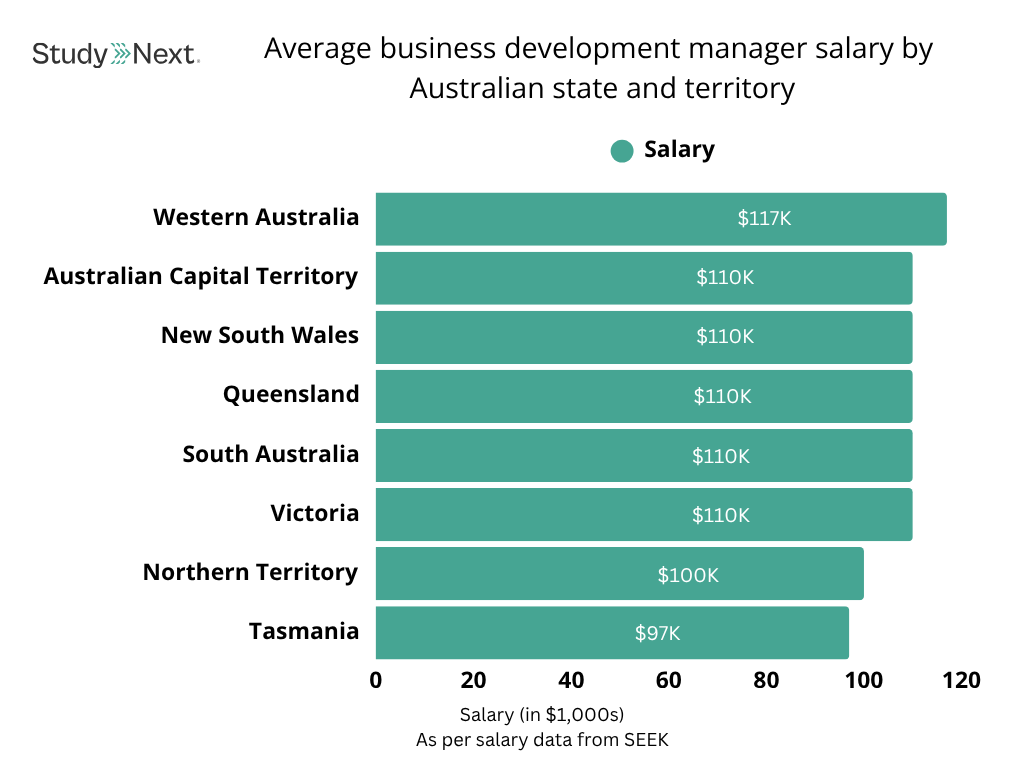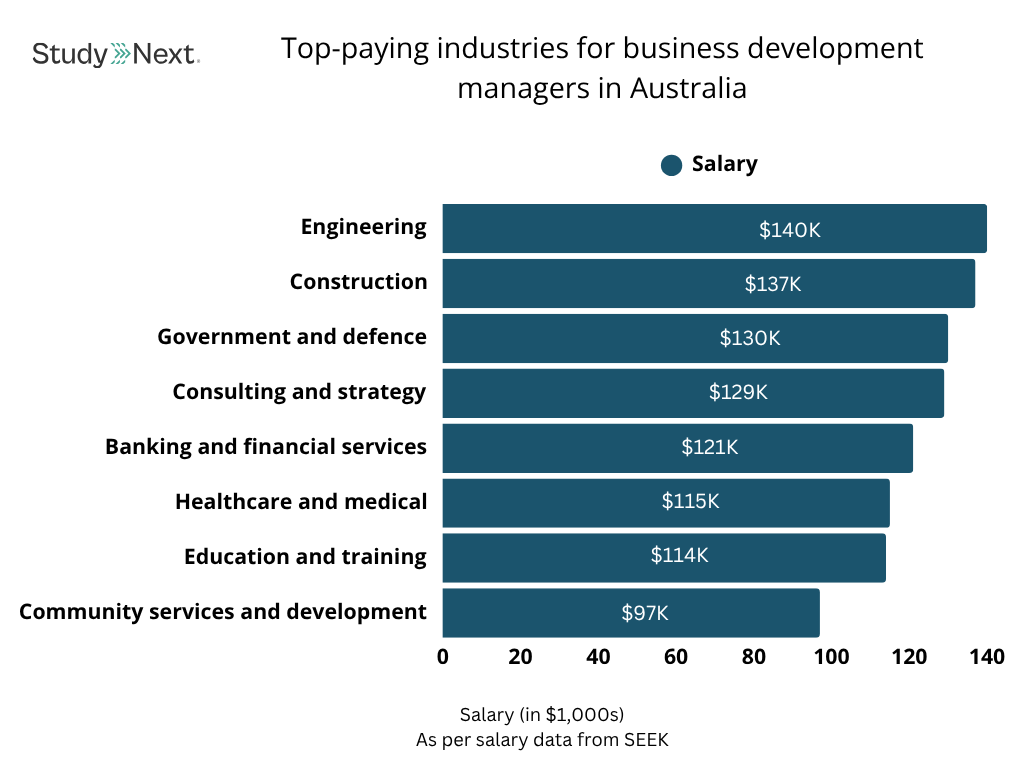In This Article
- 5 steps to becoming a business development manager in Australia
- What is a business development manager?
- What does a business development manager do?
- What is a typical business development manager salary in Australia?
- What skills does a business development manager need?
- Develop your business career with a postgraduate degree

Business development managers play a key role in helping companies increase revenue and expand their reach. They translate opportunities into sustainable business outcomes that can enhance overall organisational performance.
In this article, we explore what business development managers do, how much they earn across industries and how to thrive in this exciting career path.
5 steps to becoming a business development manager in Australia
Becoming a business development manager in Australia typically requires a combination of relevant education and industry experience. Pursuing postgraduate study and building a strong professional network can also significantly improve your job prospects. Explore what your career journey can look like as a business development manager:
1. Obtain an undergraduate degree
Earning a formal qualification can provide you with a solid foundation to start your career in business development. You can complete a bachelor’s degree in business, commerce, marketing or a related field to gain fundamental knowledge of how businesses operate and grow. This typically takes three years of full-time study.
Through your studies, you can build expertise in core business development areas such as sales strategy, market research, financial analysis and customer relationship management. You can also enhance your strategic thinking and problem-solving abilities, which are critical for finding and pursuing growth opportunities. Many programs offer internships or industry placements, giving you real-world experience and helping you apply what you’ve learned in professional settings.
2. Acquire work experience
After graduating, you can start pursuing entry-level roles that can deepen your understanding of business operations. You can consider careers in sales, customer relationship management and marketing to gain valuable exposure to client engagement, market development and growth strategies. At this stage, it’s also important to familiarise yourself with the specific industry you want to work in and begin developing specialised skills relevant to business development in that sector.
3. Consider postgraduate studies
You can improve your credibility to lead teams and projects by exploring business development courses at a postgraduate level. Pursuing this qualification can help you refine your strategic thinking, enhance critical analysis and deepen your expertise in specialised areas like digital marketing, international business or finance, depending on your industry focus.
If you’re looking to boost both your leadership capabilities and business acumen, you can consider pursuing a Master of Business Administration (MBA). Not only do MBAs provide in-depth knowledge of core business topics, but they also emphasise collaboration, innovation and leadership development, which are key skills for managing teams, nurturing client relationships and overseeing cross-functional projects.
Postgraduate studies also offer valuable networking opportunities. For example, the University of South Australia (UniSA)’s partnership with the Australian Institute of Company Directors provides you with the chance to take the Company Directors Course as part of your Master of Business Administration program. The Master of Business Administration course at Queensland University of Technology (QUT) offers an online short-term international exchange program, allowing you to study with some of the world’s top business schools.
Find more MBA courses below.


The International Master of Business Administration degree will develop your knowledge of the global business environment and enable you to maximise your career development opportunities and employment prospects. You will benefit from a range of experience-based learning opportunities, including overseas study trips and business mentorships with a senior business leader through the Executive Partners Program.
Your studies will focus on international business strategy, international trade, global marketing, and management across cultures – the knowledge you will need to accelerate your career as a business professional in an international context.


The AGSM Master of Business Administration (MBA) is a full-time, accelerated degree designed to prepare students for senior leadership roles across the private, public and not-for-profit sectors. Expand your skill set for the future through active learning experiences while unlocking the practical tools you’ll need to thrive in your professional endeavours.
Gain insights from renowned academics and industry leaders in the corporate, government, and not-for-profit sectors. Through their teachings of contemporary foundational and elective courses, your studies will focus on strategy, finance and marketing, innovation, entrepreneurship, digital transformation, technology and social impact.
4. Grow your professional network
Besides networking during your postgraduate studies, you can also explore other ways to connect and engage with other professionals in the business world. Networking is crucial in your line of work as it can lead to new business opportunities. Attending industry and networking events not only helps you build valuable relationships but also keeps you updated on the latest trends, which can add more value to your market research.
A strong professional network can also open doors to career opportunities that can accelerate your growth. Your contacts may refer you to hiring managers, alert you to job openings or collaborate on business projects that can enhance your professional portfolio.
5. Apply for a business development manager role
Business development manager roles typically require you to have three to five years of practical experience, according to job vacancies posted on SEEK. Throughout your career, focus on building a strong sales track record and hitting performance targets to help you prepare for more senior roles. When applying for a business development manager job, highlight your contributions to business growth and achievements that demonstrate your ability to drive results.
What is a business development manager?
A business development manager supports the long-term success of a business by finding new opportunities for growth. This can involve identifying untapped markets, finding strategic partnerships and building strong relationships with clients. The role combines both forward-looking planning and tactical execution to help ensure a business remains competitive.
Business development managers work closely with various people within their company. They may work with account managers, sales executives and managers across diverse functions like marketing, finance and operations. Externally, they frequently engage with potential clients to propose and negotiate contracts as well as nurture relationships with existing partners.
These business development professionals are valued across many industries, such as retail, manufacturing, finance and technology. They spend most of their time at the office participating in meetings and conducting research for clients. These professionals also typically meet clients, attend networking events and represent their organisation at industry conferences.
What does a business development manager do?
While business development managers are primarily responsible for identifying business opportunities, their specific responsibilities may vary depending on their role, organisation and industry. In the construction industry, for example, business development managers may focus on sourcing new building projects. Information and communication technology (ICT) business development managers, on the other hand, may concentrate on generating opportunities after understanding their customers’ technological requirements.
Despite these variations, several core duties are commonly found in business development manager jobs, including:
- Setting business goals to achieve
- Developing long-term business growth strategies
- Researching new markets
- Managing relationships with current partners
- Preparing proposals for potential clients
- Attending industry events, exhibitions and conferences
- Offering expert advice on company products and services
- Negotiating and managing client contracts
What is a typical business development manager salary in Australia?
SEEK reports that the average salary for a business development manager in Australia ranges from $100,000 to $120,000 per year. Find out the typical annual salary for this role in each state and territory below:

A business development manager’s income may also differ according to which industry they work in, such as:

What skills does a business development manager need?
A business development manager requires a blend of hard skills, such as commercial acumen, business awareness and account management, and soft skills like negotiation, communication and strategic thinking. Explore these business development manager skills below and why you should develop them to thrive in your career.
Hard skills
Commercial acumen: This is a core skill for business development managers as it helps you determine high-impact opportunities that align with your company’s growth goals. It enables you to prioritise business ventures that can produce the most profitable outcomes.
Business awareness: You should have an in-depth understanding of what your organisation offers and where it stands in the industry. This awareness helps you engage and negotiate business contracts with clients effectively. The skill also involves staying informed about market trends and your competitors to help you develop strategic growth plans.
Account management: In this role, you’ll typically be managing multiple clients at the same time. Strong account management skills help you build trust with new clients while maintaining engagement with existing ones. It also enables you to uncover growth opportunities within current accounts, which is just as important to business development as securing new leads.
Soft skills
Negotiation: Negotiation is a vital part of securing partnerships and closing deals. Being an expert negotiator enables you to develop agreements that bring the most benefits for your organisation while maintaining positive client relationships. It also helps you build trust and persuade potential partners to do business with your company.
Communication: As a business development manager, clear and effective communication is crucial. Your work involves regularly interacting with colleagues, clients and other stakeholders in various ways like meetings, video calls and emails. Strong communication skills help ensure your ideas are understood and your proposals, both written and verbal, are compelling.
Strategic thinking: Your role requires you to continuously think of ways to grow the business. Strategic thinking allows you to analyse market trends and examine business needs effectively. This skill also helps you spot opportunities and design strategic plans that can drive long-term impact.
Develop your business career with a postgraduate degree
Business development managers play a vital role in securing an organisation’s success and sustainability in the long run. Building a career in this field requires a blend of hands-on experience and formal education in business-related disciplines. You can hone your business expertise and get ahead in your career with postgraduate studies. Take the first step and discover a wide range of postgraduate business courses available in Australia.























